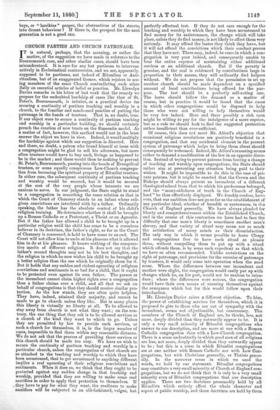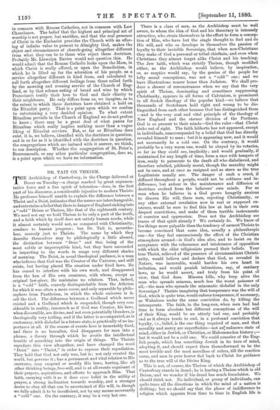CHURCH PARTIES AND CHURCH PATRONAGE. perfectly effectual test. If they
do not care enough for the teaching and worship to which they have been accustomed to find money for its maintenance, the change which will take place, unless they do find money, is not likely to affect them very seriously. It may offend the tastes they think they have, but it will not offend the convictions which their conduct proves that they have not. There may, indeed, be cases in which a con- gregation is very poor indeed, and consequently unable to bear the entire expense of maintaining either additional services or an additional church. But if the poverty is genuine, and the zeal is evidenced by contributions large in proportion to their means, they will ordinarily find helpers without. We do not propose that the permission to set up another church should be made dependent on a specified amount of local contributions being offered for the pur- pose. The test should be a perfectly self-acting one. The leave should follow the demand as a matter of course, but in practice it would be found that the cases in which other congregations would be disposed to help those who were not willing to help themselves would be very few indeed. Here and there possibly a rich man might be willing to pay for the indulgence of a mere caprice, but as a rule we should look to find the suggested protection rather insufficient than over-sufficient.
Of course, this does not meet Mr. Alford's objection that occasional religious revolutions are positively beneficial to a congregation, and that any accidental element in the present system of patronage which helps to bring them about should consequently be welcomed. Indeed, Mr. Alford's reasoning seems rather to demand a modification of the law in an opposite direc- tion. Instead of trying to prevent patrons from forcing a change of teaching and worship upon congregations, the State should rather aim at preventing any attention being paid to their wishes. It might be impossible to do this in the case of pri- vate patrons, but it might be enacted that the Crown and the Bishops should always present an incumbent of a different theological school from that to which his predecessor belonged, and the " many-sidedness of truth in the Church of Eng- land" be thus effectively displayed. We frankly confess, how- ever, that our ambition does not go so far as the establishment of any particular ideal, whether of breadth or narrowness, in the Church of England generally. We have always pleaded for liberty and comprehensiveness within the Established Church, and in the course of this contention we have had to face the difficulty that one man's liberty is sometimes another man's slavery, and that variety of ritual may mean not so much the satisfaction of many minds as their dissatisfaction. The only way in which it seems possible to leave Clergy and congregations free to have such ritual as pleases them, without compelling them to put up with a ritual which offends them, is by some such expedient as that which we have so often recommended. Unlike restrictions on the right of patronage, and provisions for the exercise of patronage by trustees, it would only come into operation when the need arose. Where the differences between one incumbent and another were alight, the congregation would easily put up with changes which he, on his part, would not be anxious to intro- duce ; where the differences were serious, the congregation would have their own means of ensuring themselves against the annoyance which but for this would follow upon their introduction.
Mr. Llewelyn Davies raises a different objection. To him, the power of establishing services for themselves, which it is proposed to give to those who are out of sympathy with the incumbent, seems not objectionable, but unnecessary. The members of the Church of England are, he thinks, less, not more, deeply divided than they outwardly appear to be. It is only a very small minority of Ritualist congregations who. answer to our description, and are more at one with a Roman Catholic congregation than with a Low-Church congregation.
There is a sense undoubtedly in which good men of all religions are less, not more, deeply divided than they outwardly appear to be ; but this is a sense in which Ritualist congregations are at one neither with Roman Catholic nor with Low Con- gregations, but with Christians generally, or Theists gener- ally. In the narrower sense in which we used the words, we hold by our statement. Ritualist congregations may constitute a very small minority of Church of England con- gregations, but we do not think that it is only to a very small minority even of Ritualist congregations that our description applies. There are two doctrines presumably held by all Ritualists which entirely affect the whole character and aspect of public worship, and these doctrines are held by them in common with Roman Catholics, not in common with Low Churchmen. The belief that the highest and principal act of worship is not prayer, but sacrifice, and that the real presence of Christ in the Eucharist provides the Church with an offer- ing of infinite value to present to Almighty God, makes the object and circumstances of church-going altogether different from what they can be to those who reject these doctrines. Probably Mr. Llewelyn Davies would not question this. He would admit that the Roman Catholic looks upon the Mass, in which Christ is really offered, or upon the Benediction, in which he is lifted up for the adoration of his people, as a service altogether different in kind from, and calculated to call forth altogether different feelings from those called forth by the morning and evening service of the Church of Eng- land, or by that solemn eating of bread and wine by which Protestants testify their love to God and their charity to their neighbours. He only differs from us, we imagine, as to the extent to which these doctrines have obtained a hold on the Ritualist party. That is a point upon which we confess to entertaining a very decided opinion. To what extent Ritualism prevails in the Church of England we do not profess to know ; there may be a great deal of what passes for Ritualism which really implies nothing more than a vague liking of Ritualist services. But, so far as Ritualism does exist, it is, we believe, identfied with the doctrines in question, and in so far as it is identified with the doctrines in question, the congregations which are imbued with it answer, we think, to our description. Whether the congregation of St. Peter's, Bournemouth, or any other particular congregation, does so, is a point upon which we have no information.



































 Previous page
Previous page